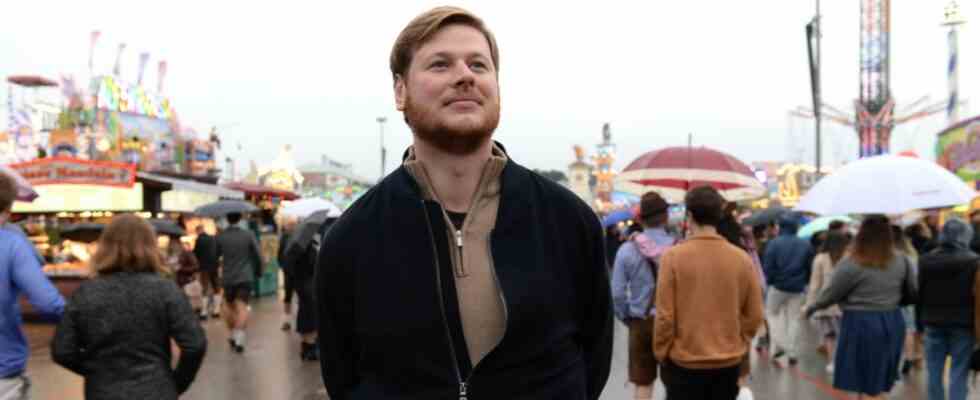Valentin Schlagheck lives in a beautiful, well-kept old building – and he is pretty well isolated from the outside world. A dense, high hedge, a garden gate that measures more than two meters, and behind it a second, smaller fence in front of bicycle racks and the garden. Schlagheck lives in a state of emergency these days. He is a direct resident of the Theresienwiese. But while many of the Oktoberfest neighbors complain bitterly about the noise, the heavy traffic and drunks who mob around or even lie in the doorway, it seems pretty relaxed. “What should you do, that’s just part of it,” says the 30-year-old. Maybe it’s the robust fence that strengthens his nerves.
Valentin Schlagheck has lived here, in one of the thoroughfares leading to the Wiesn, for 24 years. He’s used to people in traditional costume crowding from the subway exit at Goetheplatz to the Festwiese for a good two weeks a year. In the strangest of conditions, sometimes half the night. “That doesn’t bother me, the good location is important to me,” he emphasizes.
Some of the neighbors at his house go away for two weeks to escape the turmoil. Not Valentin Schlagheck. Because he himself goes to the Oktoberfest “very much and regularly”. His siblings, who grew up here, also have a close connection to the largest folk festival in the world. His sister is currently working in a sausage stand and his brother is a bartender.
When the tents close, everyone comes to him for a nightcap
Schlagheck prefers to go camping with a large group of friends. Not every day, but quite often. And now you can understand why he emphasizes the good location of his apartment: When the tents close, everyone comes to him for a nightcap. If you can’t make it home after that, you don’t have to worry about a roof over your head. How convenient.
In his apartment you can hear the noise from the street and from the Theresienwiese even with the windows closed. “The screams from the rides are the loudest,” says the 30-year-old. Nothing will help then, he says with a smile. Then he just goes over there and rides a lap of high energy or a Ferris wheel himself.
Then, around midnight, it also got quieter in Schlagheck’s apartment. The only thing that bothered him was the stragglers, who ran down the street very late at night, savagely and rudely, he says. “Especially when they roar a hit that has been tormenting you all evening as an earworm.
To be on the safe side, you should park your car in the underground car park
At five o’clock in the morning we continue in the otherwise tranquil side street: the loud road sweepers are approaching. At least the streets are clean when you leave the house after a sometimes sleepless night. 24 years of experience as a neighbor of the Wiesn have also turned Valentin Schlagheck into a purchasing professional. Preferably not at the weekend, because it’s too crowded then. And preferably not in the immediate vicinity, because it’s too expensive there. Many dealers screwed up the prices. “Leberkäs rolls cost a lot more here than usual, but then I don’t eat Leberkäse in the two weeks,” he says. Another tip from the pro: If you drive away by car, you should urgently take it to the underground car park afterwards, side mirrors are too often kicked out.
The city takes care of the cleaning, but otherwise the residents are on their own. What does Schlagheck think of the proposal to introduce a compensation voucher for residents? “It would certainly be a nice gesture, especially for the neighbors who are really bothered by the Oktoberfest.”
Would he like to live somewhere else? “No way!” He regularly goes jogging or inline skating on the otherwise empty large area in front of his front door. But the young man has one wish for Oktoberfest visitors: “Don’t yell at the whole street when you walk home.” But, he then restricts again: “Most of them don’t do that this year anyway. That’s more of an exception.”

